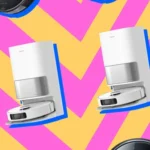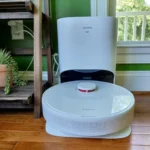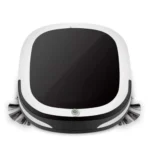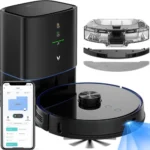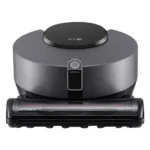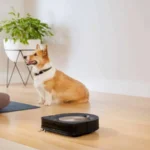Our homes are meant to be our sanctuaries, and keeping them clean is an important part of maintaining a healthy and comfortable living environment. With technology advancing at an incredible pace, we now have access to efficient and innovative cleaning tools like smart vacuum cleaners that can make our lives easier. However, as we strive to keep our homes clean, it’s important to consider the impact our cleaning practices have on the environment. Smart vacuum cleaners have gained significant popularity, but with power comes responsibility. In this article, we’ll take a closer look at the environmental impact of smart vacuum cleaners, exploring the ways in which they can be both beneficial and harmful to our planet. We’ll also provide tips on choosing eco-friendly smart vacuum cleaners and highlight the importance of contributing to a greener world.
The Basics of Smart Vacuum Cleaners
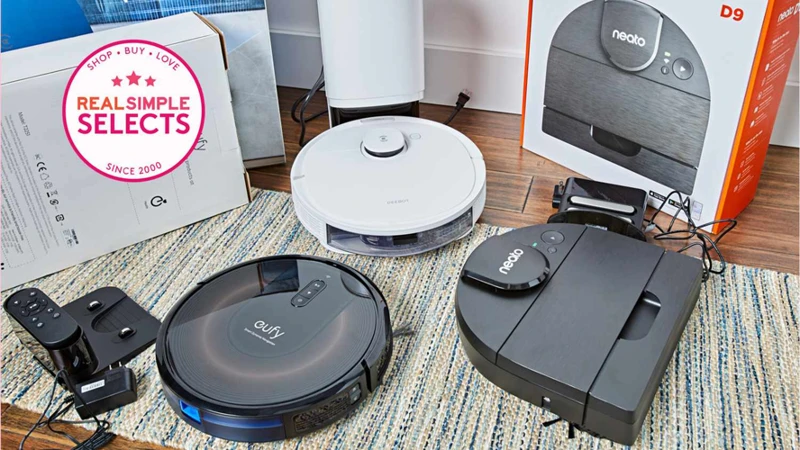
Smart vacuum cleaners have become an essential tool for households looking to keep their floors clean with minimal effort. These innovative devices are equipped with advanced features that make cleaning easier than ever before. But how exactly do smart vacuum cleaners work, and what sets them apart from traditional vacuum cleaners? In this section, we’ll explore the ins and outs of smart vacuum cleaners, from their features and benefits to their impact on the environment. If you’re considering investing in a smart vacuum cleaner, it’s important to understand the basics before making your purchase. And if you’re interested in learning more about vacuums in general, check out our article on the pros and cons of robot vacuum cleaners.
How Do Smart Vacuum Cleaners Work?
One of the most significant advantages of smart vacuum cleaners is the advanced technology they utilize to clean floors effectively and efficiently.
Smart vacuums work according to the following basic principles:
| Sensors | The vacuum uses advanced sensors to detect dirt and debris on the floor. These sensors help guide the vacuum on where to clean effectively without bumping into walls or furniture. |
| Filtration Systems | The vacuum may have a HEPA filter or advanced filtration system for removing allergens and fine particles during the cleaning process. |
| Navigation and Mapping | The vacuum uses software to memorize the layout of the room and the location of obstacles. This enables the vacuum to move around the room and clean hard-to-reach spots effectively. |
| Power Management | The vacuum has an optimized power management system that adjusts the power output according to the type of surface being cleaned. |
| Remote Control and Mobile App Integration | Some smart vacuums include remote control and mobile app integration features for remote monitoring and hands-free cleaning. |
Smart vacuums are also designed for easy maintenance and cleaning. Some models have detachable parts and washable filters for added convenience.
For more information on smart vacuums, check out our article on smart vacuum choosing tips.
Smart Vacuum Cleaner Features
Smart vacuum cleaners come packed with a variety of features that make them stand out from traditional vacuum cleaners. These features not only make cleaning more efficient but also contribute to reducing their environmental impact.
One key feature of smart vacuums is their ability to be programmed and controlled remotely via a smartphone app or voice assistant such as Amazon Alexa or Google Assistant. This means that even when you’re not at home, you can still activate the device to clean your floors, reducing the need for constant supervision.
Another innovative feature of smart vacuums is their ability to map out a floor plan of your home for optimized cleaning. This ensures that the vacuum is not needlessly covering areas that have already been cleaned, and can also be programmed to avoid specific areas of the house. This feature not only helps in conserving energy but also extends the battery life of the device.
Some smart vacuum cleaners come equipped with advanced sensors and cameras that allow them to detect obstacles and navigate around them without any assistance. These sensors can detect the room’s dust level, humidity, and temperature to ensure that the vacuum runs optimally.
Smart vacuums are also designed with rechargeable batteries, which means they don’t require constant replacements of batteries. The charging process is much more efficient, resulting in reduced energy consumption. Regular maintenance of the batteries can extend their lifespan, reducing plastic waste.
Lastly, some models come with additional accessories that cater to specific needs, such as pet hair removal or deep cleaning carpets. Choosing a smart vacuum with features that suit your needs can enhance efficiency and minimize energy consumption.
The abundance of innovative features in smart vacuums increases their efficiency while reducing their environmental impact. For more information on smart vacuums, check out this article on the Best Smart Vacuums for Pet Hair 2021.
Advantages of Smart Vacuum Cleaners
Smart vacuum cleaners have revolutionized the way we clean our homes. These advanced devices offer a range of benefits that make them a worthy investment. Some of the advantages of smart vacuum cleaners include:
- Efficient cleaning: Smart vacuum cleaners use advanced sensors and mapping technology to navigate your home and clean your floors with precision. They are programmed to avoid obstacles, go under furniture and reach tight spaces with ease. This ensures that every nook and cranny of your home is spotlessly clean.
- Convenience: With smart vacuum cleaners, you can clean your home without lifting a finger. These devices come with mobile apps that allow you to schedule cleaning sessions remotely. You can set them to clean at specific times – say, when you’re at work – so that you come home to a clean house.
- Improved air quality: Smart vacuum cleaners come with HEPA filters that trap allergens and pollutants, improving the air quality in your home. This is especially beneficial for people with allergies or respiratory problems.
- Saves time and effort: With a smart vacuum cleaner, you don’t have to spend hours cleaning your home. These devices can clean in a fraction of the time it would take you to do it manually. This gives you more time to focus on other important tasks.
The advantages of smart vacuum cleaners make them a valuable addition to any household. Not only do they make cleaning easier and more efficient, but they also offer improved air quality and save time and effort. As technology continues to advance, we can expect even more impressive features and benefits from future smart vacuum cleaners. To learn more about the different types of vacuums available, check out our article on handheld vs. stick vacuums. For tips on maintaining your smart vacuum, visit our article on smart vacuum cleaner maintenance.
The Environmental Impact of Smart Vacuum Cleaners
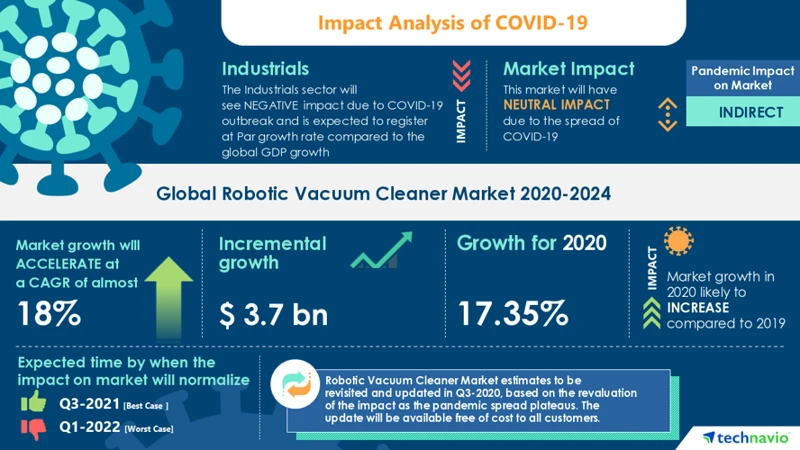
As we continue to integrate technology into our daily lives, we must also consider its impact on the environment. Smart vacuum cleaners are becoming increasingly popular due to their advanced features and convenience. Although they offer benefits such as reduced energy consumption and improved air quality, it’s important to take a closer look at the environmental impact of these devices. In this section, we will explore the potential long-term effects of smart vacuum cleaners on the environment and discuss ways to choose an eco-friendly option. Let’s dive in and see how we can make a difference for our planet’s future. To learn more about the future of smart vacuum cleaners, check out our article on the future of smart vacuums.
Reduced Energy Consumption
Reduced energy consumption is one of the most significant environmental benefits of smart vacuum cleaners. These devices are designed to use less energy than traditional vacuum cleaners, which means they can help lower your power bills and reduce your carbon footprint. According to experts, smart vacuums can use up to 50% less energy than traditional vacuums, which makes them a most eco-friendly choice for cleaning your home.
One of the reasons why smart vacuums are more energy-efficient is their advanced technology. These devices often use sensors to detect rooms’ layout and adjust their cleaning pattern accordingly. By taking a more intelligent approach to cleaning, smart vacuum cleaners can operate more efficiently and use less power.
To illustrate the significance of reduced energy consumption, let’s take a look at how much energy a smart vacuum cleaner uses compared to a traditional vacuum. The table below shows a comparison of the average energy consumption of both types of vacuum cleaners.
| Average Power Consumption | Annual Energy Use | |
|---|---|---|
| Smart Vacuum Cleaner | 500 watts | 250 kilowatt-hours |
| Traditional Vacuum Cleaner | 1,200 watts | 600 kilowatt-hours |
As you can see, smart vacuum cleaners consume only half as much power as traditional vacuums. This means that a smart vacuum cleaner can save you up to 350 kilowatt-hours of energy per year. In addition to reducing your energy bills, this also means that you can significantly reduce your carbon footprint.
It’s important to note that reduced energy consumption is just one of the environmental benefits of smart vacuums. These devices also have other eco-friendly features, such as improving air quality and reducing plastic waste. However, choosing a smart vacuum with energy-efficient features is an easy way to contribute to a greener world while keeping your home clean with minimal impact on the environment.
To learn more about charging and battery management in smart vacuum cleaners, please see our article on charging and battery management.
Improved Air Quality
One of the most beneficial impacts of smart vacuum cleaners on the environment is their ability to improve air quality inside your home. Traditional vacuum cleaners, especially those with poor filtration systems, tend to release dust, pollen, and other allergens back into the air. This can be particularly harmful to individuals with allergies, asthma, or other respiratory issues. However, smart vacuum cleaners combat this problem by using high-quality filtration systems that capture even the tiniest particles.
The filters inside smart vacuum cleaners are often made of HEPA material (High-Efficiency Particulate Air), which can effectively trap particles as small as 0.3 microns. This ensures that the air inside your home is free of dust, pollen, and other allergens that can pose a health risk. Additionally, some smart vacuum cleaners even have built-in air purifiers, further enhancing their ability to improve air quality.
Investing in a smart vacuum cleaner that prioritizes air quality can make a significant impact on your quality of life. Not only will you breathe easier, but allergens and pollutants won’t be circulating in the air, causing health issues in the long run. Plus, cleaning with a smart vacuum cleaner can help decrease the number of respiratory triggers for people with respiratory issues.
If you’re looking to make a positive impact on the environment and on your health, a smart vacuum cleaner with HEPA filtration or an air purifier can be a great investment. By improving air quality, you’ll be doing your part to create a healthier home and contribute to a greener world.
Reduced Plastic Waste
When looking at the environmental impact of smart vacuum cleaners, one important factor to consider is the amount of plastic waste they generate. Traditional vacuum cleaners typically require users to purchase and dispose of replacement bags frequently, contributing to the growing plastic waste problem. However, smart vacuums have introduced a new solution to this issue.
Instead of using disposable bags, most modern smart vacuums feature reusable dustbins made from durable materials such as polycarbonate. This not only reduces the amount of plastic waste generated but also saves money for users who no longer need to purchase replacement bags regularly. Some smart vacuums even feature washable filters that can be reused multiple times, further reducing plastic waste.
To compare the plastic waste generated by traditional vacuum cleaners versus smart vacuum cleaners, we can take a look at the following table:
| Traditional Vacuum Cleaners | Smart Vacuum Cleaners | |
|---|---|---|
| Plastic Waste Generated | Regular replacement of plastic bags | Reusable dustbins made from durable materials |
| Environmental Impact | Contributes to plastic waste problem | Reduces plastic waste and promotes sustainability |
As we can see from the table, smart vacuum cleaners are the more environmentally friendly option when it comes to plastic waste generation. By using durable and reusable materials, they not only reduce plastic waste but also promote sustainability. This is one of the many ways in which smart vacuum cleaners can contribute to a greener world.
Impacts of Charging and Battery Use
As with any electronic device, the charging and battery use of smart vacuum cleaners have their own environmental impacts to consider. Here are some key points to keep in mind:
- Battery lifespan: Smart vacuum cleaners typically use rechargeable batteries, which have a limited lifespan. Over time, the battery will gradually lose its ability to hold a charge, and eventually, it will need to be replaced. This contributes to the overall electronic waste problem, as discarded batteries can end up in landfills and release harmful chemicals into the environment.
- Charging frequency: The more frequently you need to charge your smart vacuum cleaner, the more energy it will consume. While some models come with more efficient charging systems, others may take longer to charge or require more energy to reach a full charge.
- Charging time: Smart vacuum cleaners typically need to be charged for several hours before they can be used again. This means that you may need to plan ahead and schedule your cleaning sessions accordingly, especially if you have a larger house or multiple floors to clean.
- Energy source: The type of energy used to charge your smart vacuum cleaner also has an impact on the environment. If you use electricity generated from renewable sources, such as solar or wind power, then your overall environmental impact will be lower than if you rely on fossil fuels.
It’s important to keep these factors in mind when using your smart vacuum cleaner. To minimize your environmental impact, consider the following tips:
- Maximize battery lifespan: Be sure to follow the manufacturer’s recommendations for charging and caring for your battery. Avoid letting it run down completely and try to keep it at a moderate temperature when not in use, as extreme temperatures can also damage the battery.
- Choose an energy-efficient model: Look for smart vacuum cleaners that have efficient charging systems and low standby power consumption. These may cost more upfront, but can save you money in the long run by reducing your energy consumption and extending the lifespan of your battery.
- Use renewable energy sources: If possible, consider using renewable energy sources to power your smart vacuum cleaner. This can be as simple as charging it during the day when solar power is available, or investing in a renewable energy system for your home.
By being mindful of the impacts of charging and battery use, you can reduce your environmental footprint while still enjoying the benefits of a smart vacuum cleaner.
Long-Term Effects of Smart Vacuum Cleaners on the Environment
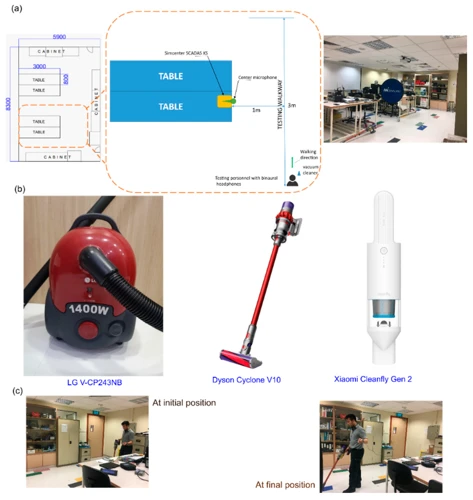
As we consider the impact of smart vacuum cleaners on our planet, it’s important to also examine their long-term effects. After all, the choices we make today will have consequences for years to come. Let’s delve deeper into how smart vacuum cleaners can contribute to a more sustainable future, and explore the positive environmental outcomes that can be achieved with these devices. Through this examination, we can gain a fuller understanding of the long-term benefits of choosing a smart vacuum cleaner that is eco-friendly and energy-efficient.
Reduced Carbon Footprint
One major environmental benefit of owning a smart vacuum cleaner is the significant reduction in carbon footprint. By using a smart vacuum cleaner, you can reduce the amount of electricity consumed by traditional vacuum cleaners, which translates to fewer greenhouse gas emissions.
Here are some ways smart vacuum cleaners help reduce carbon footprint:
- Low energy consumption: Smart vacuum cleaners are designed to be energy efficient. They are equipped with powerful motors that require less electricity to operate, reducing overall energy consumption.
- Automated cleaning: Smart vacuum cleaners come with sensors that enable them to move around your home and clean floors without human input. This ensures that they only clean when necessary, reducing the amount of time the vacuum is running and the amount of energy consumed.
- Efficient cleaning: Smart vacuum cleaners are designed to be efficient in cleaning floors. They use advanced technologies to clean the floors effectively without wasting energy. For example, they use sensors to map out a cleaning path that avoids unnecessary movements, reducing the amount of energy consumed.
By choosing a smart vacuum cleaner, you can significantly reduce your carbon footprint while still keeping your home clean. You can enjoy the convenience of an automated cleaning system while helping to create a more sustainable future for ourselves and the environment we live in.
Extended Lifespan and Durability
Smart vacuum cleaners are not only eco-friendly in terms of reduced energy consumption and improved air quality, but they also boast an extended lifespan and durability compared to their traditional counterparts. This means that they can prevent additional waste and environmental damage caused by the disposal of old and worn-out machines.
Here are some reasons why smart vacuum cleaners have a longer lifespan:
- Better Quality Materials: Smart vacuum cleaners are made using higher quality materials that are built to last. The parts are designed to withstand frequent use and are less likely to break or wear out quickly. This means that the machine can be used for an extended period without the need for replacements and repairs.
- Advanced Technology: The technology used in smart vacuum cleaners is advanced and built to last. There are fewer moving parts in the machine, which reduces the risk of mechanical failures.
- Regular Maintenance: Smart vacuum cleaners are equipped with features that allow users to maintain and clean them easily. This means that regular maintenance is more manageable, and users can keep their machines in good working order. Regular maintenance can help prevent issues and extend the life of the machine.
Here are some reasons why durability is an essential factor in eco-friendliness:
- Reduces Waste: When a vacuum cleaner wears out or breaks down, it often needs to be disposed of. This means that the machine will end up in a landfill, taking up valuable space and contributing to environmental damage. A durable machine means that fewer machines will be discarded, reducing waste and impact on the environment.
- Lower Carbon Footprint: Aside from reducing waste, a longer lifespan and durability of a smart vacuum cleaner also contributes to a lower carbon footprint. The production of new appliances requires energy and materials, which have an environmental impact. By using a machine for a prolonged period, consumers can reduce their carbon footprint by preventing the need for replacement appliances.
Choosing a smart vacuum cleaner with extended lifespan and durability is an eco-friendly decision that helps preserve the environment by reducing waste, decreasing energy consumption, and minimizing the impact of discarded machines.
Improved Sustainability
When it comes to sustainability, smart vacuum cleaners are paving the way for a greener future. These devices are designed with energy efficiency and reduced waste in mind, making them an excellent choice for eco-conscious consumers. Let’s take a closer look at some of the ways in which smart vacuum cleaners are improving sustainability.
One key factor to consider is the use of recycled materials in the manufacturing process. Many smart vacuum cleaner brands prioritize sustainable sourcing and production methods. They often use recycled plastics and other materials to reduce the environmental impact of their products. By choosing a vacuum made with recycled materials, you can help reduce the amount of waste sent to landfills and lower the overall carbon footprint of the manufacturing process.
Another way that smart vacuum cleaners improve sustainability is through their energy efficiency. Smart vacuums often have features that allow them to use less energy while still providing powerful suction. For example, some models have sensors that detect when they’re cleaning a particularly dirty area and automatically increase suction power for optimal cleaning. Others have timers that allow you to set the length of the cleaning cycle, so you’re not wasting energy running the vacuum longer than necessary.
Many smart vacuum cleaners are designed with rechargeable batteries. This feature reduces the amount of disposable batteries that end up in landfills and reduces overall waste. It’s important to note that while the batteries do have a limited lifespan, they can often be recycled once they reach the end of their usefulness.
Improved Sustainability Strategies
Recycled materials Energy efficiency Rechargeable batteries
Reduces waste from manufacturing process Uses less energy while still providing powerful suction Reduces amount of disposable batteries in landfills
Lower overall carbon footprint Timer feature prevents the vacuum from running longer than necessary Batteries can often be recycled once they reach end of lifespan
Choosing a Sustainable Smart Vacuum Cleaner
If sustainability is a top priority for you, it’s important to consider all of these factors when choosing a smart vacuum cleaner. Look for models that are made with recycled materials and have energy-saving features that are easy to use. It’s also worth researching the lifespan and recyclability of the vacuum’s battery to ensure you’re making the most eco-friendly choice possible.
Smart vacuum cleaners offer a more sustainable, eco-friendly option for cleaning your home. By choosing a model that prioritizes sustainability, you can lower your carbon footprint and contribute to a greener world.
How to Choose an Eco-Friendly Smart Vacuum Cleaner
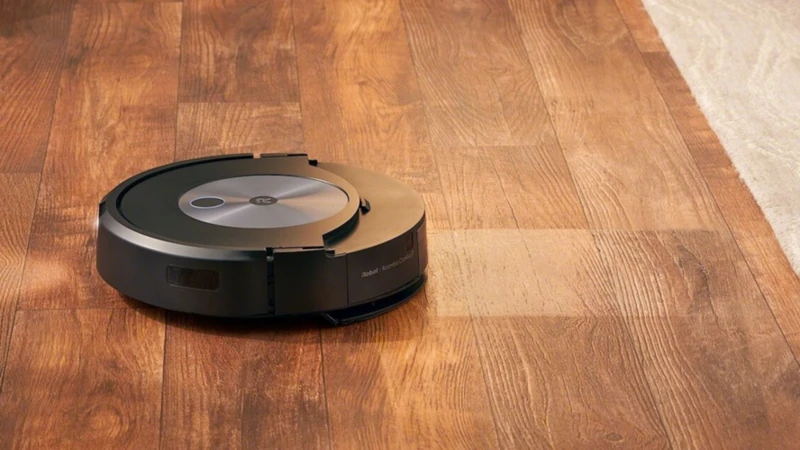
When it comes to choosing an eco-friendly smart vacuum cleaner, there are several factors to consider. The following are some tips that can help you make a sustainable choice that reduces your environmental impact:
1. Energy Efficiency: Look for smart vacuum cleaners that are energy efficient and have a low power consumption rating. This will help reduce your energy consumption and lower your electricity bills.
2. Sustainable Materials: Check if the vacuum cleaner’s body is made from sustainable materials such as recycled plastic or bamboo. These materials are environmentally friendly and can help reduce the carbon footprint of your cleaning device.
3. HEPA Filters: Consider smart vacuum cleaners that come equipped with High-Efficiency Particulate Air (HEPA) filters. These filters can trap microscopic particles, including pet dander, pollen, and dust mites, which improves the air quality of your home and reduces the risk of respiratory disorders.
4. Cordless and Battery Power: Opt for cordless smart vacuum cleaners that run on rechargeable batteries. This reduces the need for disposable batteries and prevents the pollution of landfills with toxic waste.
5. Durability: Choose smart vacuum cleaners that are durable and have a long lifespan. This way, you won’t have to replace your vacuum cleaner frequently, which not only saves you money in the long run but also reduces your environmental impact.
6. Packaging: Consider smart vacuum cleaners that come with minimal packaging or eco-friendly packaging made from recycled materials.
By following these tips, you can purchase an eco-friendly smart vacuum cleaner that is both sustainable and efficient in keeping your home clean. Making a conscious effort to choose sustainable products can play a significant role in reducing your carbon footprint and contributing to a greener world.
Contributing to a Greener World
Taking steps to make our homes and lifestyles more environmentally-friendly is crucial in the fight against climate change. By incorporating smart vacuum cleaners into our cleaning routines, we can do our part in contributing to a greener world.
Reducing Energy Consumption: Switching to a smart vacuum cleaner can help reduce energy consumption and save money on your electricity bill. These devices are designed with energy-efficient motors that consume less power as compared to traditional vacuum cleaners. Additionally, many smart vacuum cleaners are equipped with sensors that detect when the cleaning is done, so you don’t have to keep the machine running for longer than necessary.
Effective Waste Management: By opting for a smart vacuum cleaner, you can reduce plastic waste that arises from disposable plastic bags. Smart devices come with either reusable or washable filters which minimizes the requirement for single-use vacuum bags that end up in landfills or the ocean. This way, you can clean your home without harming the planet.
Extended Lifespan: Smart vacuum cleaners are designed to last for a long time, which reduces the amount of electronic waste generated. By investing in a high-quality vacuum cleaner that is durable, you won’t need to replace it as often, which means fewer electronic gadgets in the landfills.
Eco-friendly features: Lots of smart vacuum cleaners come with eco-friendly features such as efficient motors, programmable settings, and energy-saving modes that help you maximize the effectiveness of the cleaning process while minimizing the impact on the environment.
Conclusion: Choosing a smart vacuum cleaner that is eco-friendly won’t just reduce your carbon footprint but save some cash on energy bills too! Investing in a smart vacuum cleaner that prioritizes sustainability doesn’t just help in maintaining cleaner homes but also allows you to contribute towards a greener and more sustainable world.
Conclusion
After examining the environmental impact of smart vacuum cleaners and understanding their benefits, it’s clear that choosing an eco-friendly option can make a significant difference in our carbon footprint. By reducing energy consumption, improving air quality, and reducing plastic waste, these machines can help contribute to a greener world.
It’s important to note that the impacts of charging and battery use should be considered when choosing an electric smart vacuum cleaner. While they do consume energy, many manufacturers are incorporating eco-friendly measures such as using recycled materials and designing machines that have a longer lifespan and are more durable.
To choose an eco-friendly smart vacuum cleaner, research your options and look for certifications from organizations such as Energy Star, which verifies machines that meet energy efficiency standards. Consider buying from companies that prioritize sustainability and have a clear environmental policy.
The long-term effects of smart vacuum cleaners on the environment are promising. By reducing our carbon footprint, extending product lifespan, and improving sustainability, we can make a positive impact on the environment. It’s up to us as consumers to make educated choices that benefit both ourselves and the planet.
In conclusion, while smart vacuum cleaners may seem like a small part of our daily lives, they can have a significant impact on the environment. By choosing eco-friendly options, we can contribute to a greener world and make a positive difference for generations to come. Let’s take responsibility for our actions and make the best choices possible to protect our planet.
Frequently Asked Questions
What is the difference between a smart vacuum cleaner and a regular vacuum cleaner?
A smart vacuum cleaner has advanced features and can be controlled via an app or voice command. It also has sensors to navigate around a room and avoid obstacles.
How does a smart vacuum cleaner improve air quality?
A smart vacuum cleaner uses advanced filters to trap allergens and dust particles, which improves the overall air quality in a room.
Does using a smart vacuum cleaner save energy?
Yes, smart vacuum cleaners are designed to be more energy-efficient than regular vacuum cleaners, which helps to reduce your carbon footprint.
What should I look for when choosing an eco-friendly smart vacuum cleaner?
Look for a model that has high-energy efficiency ratings and is designed to last for many years. Also, check to see if the vacuum cleaner uses sustainable materials and is produced in an environmentally friendly way.
How long do smart vacuum cleaner batteries last?
The battery life of a smart vacuum cleaner will vary depending on the model and usage. Most models have a battery life of 60-90 minutes.
What is the environmental impact of charging a smart vacuum cleaner?
Charging a smart vacuum cleaner has a minimal environmental impact. Just make sure to unplug the device when the battery is fully charged to reduce energy consumption.
Can a smart vacuum cleaner clean carpets?
Yes, most smart vacuum cleaners have modes specifically designed for cleaning carpets. Just make sure the model you choose is suitable for the type of carpets in your home.
Do I need a Wi-Fi connection to use a smart vacuum cleaner?
Most smart vacuum cleaners require a Wi-Fi connection to be controlled via an app or voice command. However, some models may have a remote control that doesn’t require Wi-Fi.
Are smart vacuum cleaners worth the investment?
If you’re looking for a more convenient and efficient way to clean your home, then a smart vacuum cleaner is definitely worth the investment. Plus, it’s a more environmentally friendly option.
How can I dispose of my old vacuum cleaner in an eco-friendly way?
Check with your local recycling center to see if they accept vacuum cleaners. If so, make sure to remove any batteries and other electronic components before disposing of the device. You can also look into donating the vacuum cleaner to a local charity or organization in need.

